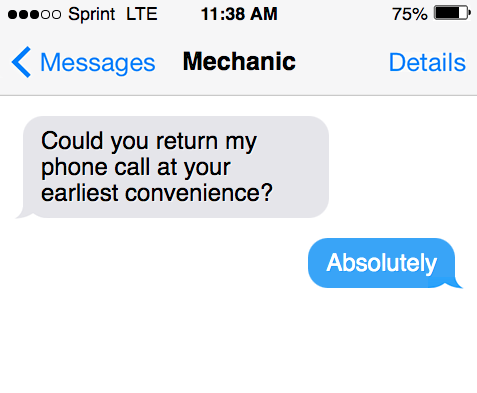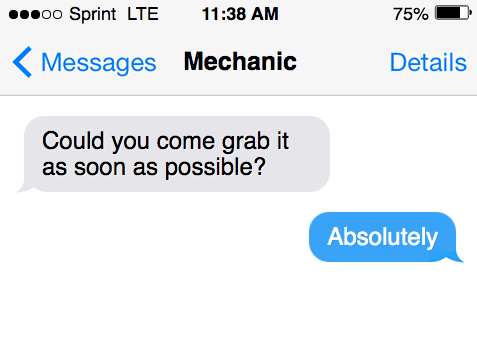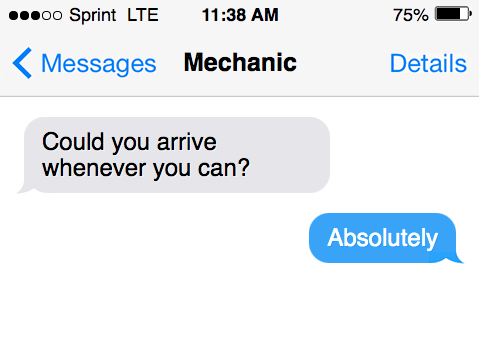At your earliest convenience. At my earliest convenience. What does this mean? Which phrase should get used in formal communication and informal communication? This common phrase can be confusing to understand. And can be confusing to use.
Read through this short guide on “earliest convenience” to understand how to use it…
What does “convenience” and “earliest convenience” truly mean?
- The state of being convenient.
- At your convenience: when you want.
- At your earliest convenience: as soon as you like or can.
Convenience as a noun used to describe a suitable time that is a choice of a person. The noun use of this word is what is typically used in phrases like “at your earliest convenience.”
- A suitable or convenient time.
- Freedom from discomfort (ease).
Spanish: lo antes que le sea posible
Synonyms: Noun
Accommodation, comfort, luxury.
Antonyms: Noun
Burden, millstone, weight.
Examples:
I like having the convenience of my coffee getting delivered to me every morning.
An auto repair scheduled the appointment to change Mrs. Smith’s tires at her convenience.
The convenience of online shopping.
Please remit the payment at your earliest convenience.
Test that assumption at your earliest convenience.
Please respond at your earliest convenience.
I look forward to hearing from you at your earliest convenience.
Please get back to me at your earliest convenience.

Is “earliest convenience” appropriate to use?
There are many ways to say to someone that they can choose based on the earliest convenience. “At your earliest convenience.” Or “At my earliest convenience.”
The determiner “my” or “your” can have drastic changes on the intention of the phrase or message.
For example, “I will deliver the food at my earliest convenience.” Is a sentence example that could get perceived as rude. The reason this could get perceived as rude is that it doesn’t take into consideration the other persons schedule, time, or mutual needs.
Example scenario
A mechanic is calling to leave a voicemail about a vehicle that’s finished getting mechanical work. The mechanic says in the voice mail message, “You can come get the vehicle at my earliest convenience.”
The recipient could get confused. Because they could be waiting to hear when the mechanic feels their earliest convenience time could be.
As a result, this is not considered a polite way to say “as soon as you can.”
Alternatively, the mechanic could say, “You can come get the vehicle at your earliest convenience. I’ll wait to hear from you.”
At your earliest convenience
The phrase is a more polite way of asking a person to complete a task. For example, return a phone call, finish a project, or arrive to a destination.
At my earliest convenience
Not a polite way of asking someone to respond or complete a task. It is considered the wrong way of asking someone to reply with answers to a question, task, project, or other.
Formality and business writing
“At my earliest convenience” should never get used in any business setting. For example, an auto response when away from a computer.
Poor example:
“I am away from my computer right now. I will return on 10/3/23. If you have written me an email, expect me to get back to you at my earliest convenience.”
Good example:
“I have stepped away from the office for some time. If you need help, please submit a request to our help desk. Additionally, I will contact when I return at your earliest convenience.“
If seeing “at my earliest convenience” in the workplace
It’s best to doubt that the writer used my or your determinators to cause you agitation. Rather, assume the write made a mistake and allow them to explain themselves in the future.
Business letter example
Here is an example business letter using proper grammar and language for the phrase, “at your earliest convenience.”
Hey John,
I’m writing to let you know that the new About page for the website is up. Could you please take a look and leave a comment on the project folder at your earliest convenience.
Our team will be moving the project to completion here soon. And we would love to ensure that the words we used to describe your business are accurate.
Thank you so much, John!
Randy
Alternatives to “earliest convenience”
There are many alternatives to the phrase, “earliest convenience.” When writing friends, colleagues, or general letters—try one of the following alternatives.
As soon as possible (ASAP)
The phrase allows the reader to see this as a mutual sign of respect.
Examples:
- I’ll try to get that over to you as soon as possible.
- I will get the account information over to you as soon as possible.

As quickly as possible
An alternative to as soon as possible. Provides emphasis on the sense of urgency or hurry.
Examples:
- I’m going to correct this as quickly as possible.
- This is a major mistake. It’s urgent. I’m going to get it to you as quickly as possible.
At the earliest convenience
Without having to use my or your as the determiner. Allows a person to convey time without misinterpreting the meaning.
Examples:
- Feel free to arrive at the earliest convenience.
Whenever you can
An alternative and variation of saying, “at your earliest convenience.” Typically, this phrase does not provide any sense of urgency. Conveys a relaxed ask to another person.
Examples:
- Whatever date you choose to arrive is up to you. Arrive whenever you can!
- If you have a moment, can you finish the accounting profit and loss statement? Feel free to finish it whenever you can.
- Whenever you can, could you take out the garbage for me? It’s starting to smell and causing a situation in the garage.

When there’s time
Another phrase that eliminates the need to put hurry around an ask.
Examples:
- Could you finish the website project when there’s time? I appreciate you.
- My inbox is a nightmare. Can you go through that when there’s time?
- When there’s time, you could call Mrs. Johnson and ask her to return our phone call?
As soon as you get a chance
Similar to “when there’s time.” Rather, another way of asking.
Examples:
- We could really use more printer paper. As soon as you get a chance, could you run up to the store to go pick more up?
- As soon as you get a chance, could you send over John Smith’s required paperwork and letter letters? There’s no rush on this ask.
- Could you call Mr. Fredrick’s and ask him to return our message about the legal documents. I appreciate you doing this as soon as you get a chance.
Sources
- CONVENIENCE | definition in the Cambridge English Dictionary
- What Is a Determiner? – English Grammar Rules & Usage
- at your earliest convenience – Longman Dictionary
- At earliest convenience – Idioms by The Free Dictionary
- at someone’s earliest convenience Definitions and Synonyms
Inside this article
Fact checked:
Content is rigorously reviewed by a team of qualified and experienced fact checkers. Fact checkers review articles for factual accuracy, relevance, and timeliness. Learn more.
Core lessons
Glossary
- Abstract Noun
- Accusative Case
- Anecdote
- Antonym
- Active Sentence
- Adverb
- Adjective
- Allegory
- Alliteration
- Adjective Clause
- Adjective Phrase
- Ampersand
- Anastrophe
- Adverbial Clause
- Appositive Phrase
- Clause
- Compound Adjective
- Complex Sentence
- Compound Words
- Compound Predicate
- Common Noun
- Comparative Adjective
- Comparative and Superlative
- Compound Noun
- Compound Subject
- Compound Sentence
- Copular Verb
- Collective Noun
- Colloquialism
- Conciseness
- Consonance
- Conditional
- Concrete Noun
- Conjunction
- Conjugation
- Conditional Sentence
- Comma Splice
- Correlative Conjunction
- Coordinating Conjunction
- Coordinate Adjective
- Cumulative Adjective
- Dative Case
- Determiner
- Declarative Sentence
- Declarative Statement
- Direct Object Pronoun
- Direct Object
- Diction
- Diphthong
- Dangling Modifier
- Demonstrative Pronoun
- Demonstrative Adjective
- Direct Characterization
- Definite Article
- Doublespeak
- False Dilemma Fallacy
- Future Perfect Progressive
- Future Simple
- Future Perfect Continuous
- Future Perfect
- First Conditional
- Irregular Adjective
- Irregular Verb
- Imperative Sentence
- Indefinite Article
- Intransitive Verb
- Introductory Phrase
- Indefinite Pronoun
- Indirect Characterization
- Interrogative Sentence
- Intensive Pronoun
- Inanimate Object
- Indefinite Tense
- Infinitive Phrase
- Interjection
- Intensifier
- Infinitive
- Indicative Mood
- Participle
- Parallelism
- Prepositional Phrase
- Past Simple Tense
- Past Continuous Tense
- Past Perfect Tense
- Past Progressive Tense
- Present Simple Tense
- Present Perfect Tense
- Personal Pronoun
- Personification
- Persuasive Writing
- Parallel Structure
- Phrasal Verb
- Predicate Adjective
- Predicate Nominative
- Phonetic Language
- Plural Noun
- Punctuation
- Punctuation Marks
- Preposition
- Preposition of Place
- Parts of Speech
- Possessive Adjective
- Possessive Determiner
- Possessive Case
- Possessive Noun
- Proper Adjective
- Proper Noun
- Present Participle
- Prefix
- Predicate



